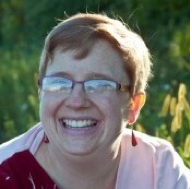My mother thought everything was knowable. This made her a very unhappy woman.
My dad died when I was 12. After his death, my mother told me the following things frequently:
1. I am really smart. And,
2. That my smartness would make me really unhappy.
Basically, I was doomed.
At that time, in the midst of adolescent angst, I believed her.
Man, did I ever know what was really going on with the world and man, was it bad!
I was right. She was right. Sort of.
I am not a love and light person.
But I am happier now at 35 than I ever have been before.
It’s not just because I am married, nor because I am happily self-employed.
It is, I believe, mostly because of my ability to believe.
Not my beliefs, though those are pretty helpful.
But because I have an ability now to have faith.
To hope.
To think, to accept, that perhaps though I can know a lot and be smart, there’s a lot I don’t know.
And that’s a good thing.
My mother wasn’t arrogant, not really. She was atheist. Agnostic on an optimistic day.
That in itself does not make a person a cynic, but she was pretty fundamentalist about it.
When I told her I’d joined a church, she told me I ruined my life.
Once her husband, my father, died way too young, her feelings about any “great unknown” (God or emptiness) got pretty smooshed.
That’s understandable. It left me pretty adrift, too.
At 12, just after my dad died, I met a guy named Jason.
He was the son of a pastor of a local born-again Christian church.
An athlete. Way out of my league.
But he and I became good friends, despite my constantly trying to seduce him.
You could say, as I have for many years, that I took Jesus Christ as my Lord and Savior at age 13 because I wanted a man’s attention.
Three men, even: Jason, his dad and God.
I don’t buy that anymore. I think, in fact, Jason was a lovely person. A great friend. When I drilled my mom on how to say “I love you” in both French and Russian so I could say them and write them to Jason, he hit me back with a poem called “Filio.” In it, he expressed (quite eloquently for a 15-year-old jock who sincerely wanted a friend out of a younger nerdy girl totally obsessed with him) his love for me—a friendship love, not a romantic love.
Jason really knew about mystery, and when to say “I don’t know.”
He also knew about friendship outside of romance, which it took me another two decades to really understand.
Jason’s dad, the pastor, told me when I was 14 or 15 that my dad went to hell because he didn’t accept the Lord as his savior (my father was also agnostic/atheist).
I left the church pretty soon thereafter.
Jason’s dad really thought he knew everything.
Now I know my mom was right—but not in the way she thought she was.
I like to think, and as she died when I was 19, I will never know for sure that if she were still alive, she would agree with me.
Knowing itself is not the problem—nor is intelligence.
It’s when we think we know it all, when we don’t allow for mystery, that we get into trouble.
As I have written recently on ele, Karma is one of the great mysteries that has taught me the power of faith.
I am Buddhist. I don’t believe in God. But I do believe in belief.
I am okay with not knowing that.
That kind of intelligence—and I would argue that knowing what we don’t know and being okay with it is a kind of intelligence—is a skillful and beneficial one. One that, when embraced, can lead to happiness.
I hope my mother found it, somehow. I know she had it—after all, I have it.
Like elephant Spirituality on Facebook
Ed: Brianna Bemel










Read 2 comments and reply